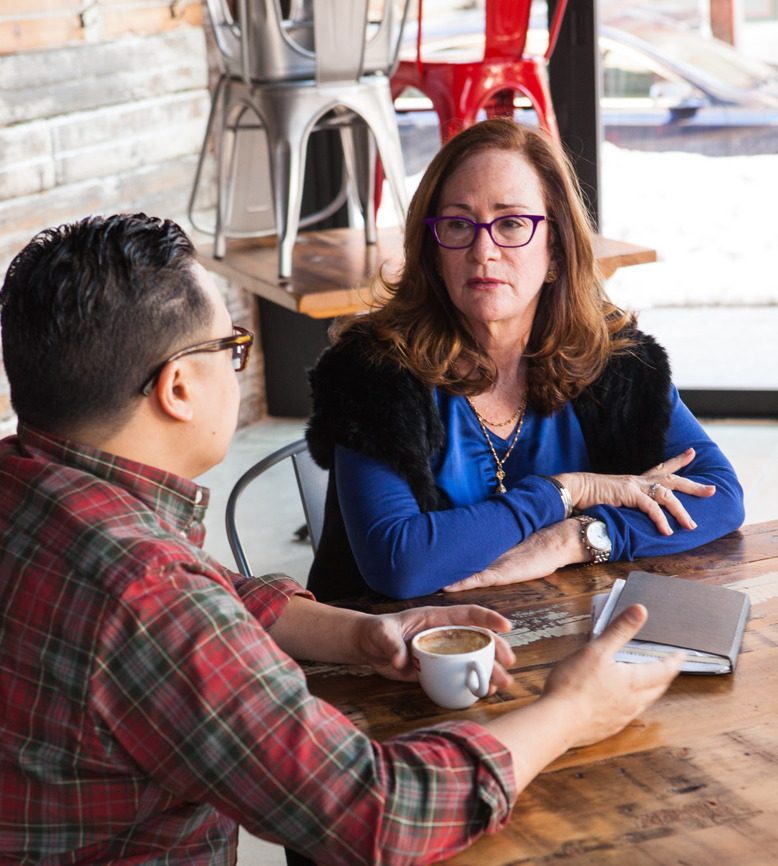
Much as she loves her work as a restaurant accountant, Donna Villardi admits it has reduced her to tears. She tells a story about Tinga, a popular taqueria in Millburn, Montclair and Westfield. “The first day I met with the owner,” she says, “I’m in the restaurant, trying to listen, and my eyes are tearing and burning. What’s going on?
“It turns out they’re slicing onions in the next room. I don’t know how anybody was getting any work done, because I was crying the whole day.”
There would be a lot more weeping—by restaurateurs—if not for the services of Vilardi+Co, the firm Vilardi runs with offices in Clifton and Manhattan.
The Montclair resident visits about a dozen restaurants a week, more than any critic. Admittedly, critics see the dining room, while she spends most of her time in cramped basement offices. But her more than 50 restaurant clients not only feed her (“They’re always asking, ‘You wanna eat? Come and eat!’”), they probably take her suggestions more to heart than anything they read in a review. The reason is simple: She saves them time and money.
Consider Uproot, a New American restaurant in Warren. Chef/owner Mark Farro and his mother, Catherine (neither trained in bookkeeping) had kept the books in a manner Farro calls “a little unorthodox.” Farro hired Vilardi in January 2014. Within a month, he says, she had helped them cut costs without sacrificing quality, and by this February Uproot had significantly bolstered its bottom line.
“She brought us into the 21st century,” Farro says. “She’s helped us tremendously.”
How did Vilardi do it? First, she got them to break down costs by category so they could aim for proven norms: Food, labor and alcohol costs, for example, should not together exceed 70 percent of sales. Rent, utilities, laundry, tableware and so forth should not gobble more than 20 percent. That leaves a 10 percent profit. “It’s really a nickel-and-dime business,” she says.
Margins are even tighter for BYOs, of which New Jersey has plenty. Apart from the high cost of obtaining a liquor license here, having one, Vilardi points out, isn’t necessarily a panacea. It requires more staff—bartenders, a sommelier. “There’s extra insurance, extra security, and the cost of inventory,” she says. “In the end, you add about 5 percent to the bottom line.”
Another thing Vilardi did was switch Uproot from cash-basis accounting to accrual-basis accounting. Accrual adds the dimension of time.
“If I sold $100 worth of food today,” she explains, “I would want to match that revenue with the expense of buying the food, whether I pay for the food now or 30 days from now.”
Got that? If not, Vilardi sympathizes. “Bookkeeping,” she admits, “is so dry.”
Yet certain things that set the restaurant business apart are easily grasped. One is that much of the inventory is perishable. If you order more scallops than you sell, when you throw out what you don’t sell, you throw away money.
Another is that revenue varies with the season. May, which includes Mother’s Day, is the busiest month, January the bleakest. Power outages and storms wreak havoc with even the most careful chef’s planning.
A restaurant has to manage labor costs in a like manner. Vilardi saved Uproot money by helping them schedule servers’ hours more efficiently, lessening the need to pay overtime.
Owners have to keep a sharp eye even on nonperishable goods, especially liquor. Vilardi advises clients to inventory food and alcohol every week. In one case, she told the restaurant to take a nightly bottle count because weirdly, while food sales had gone way up, alcohol sales had stayed the same. Management soon unearthed a scheme by employees to increase their tips. “The owners,” Vilardi relates, “interviewed some guests, who said they hadn’t paid for a drink in months.”
For about 80 percent of her clients, Vilardi and her staff of 20 not only keep the books, they pay all the bills. Paying on time is especially crucial when buying beer, wine and liquor. Fall behind and the state will put you on a list requiring you to pay cash on delivery until you catch up. “You don’t want to be on that COD list,” she says.
Vilardi, a Boston native, fell in love with restaurants at age 12 on a family trip to Manhattan. They dined at the Four Seasons, where Vilardi swooned over the food, lighting, tableware and decor. “I loved that it touched all my senses,” she says.
She got an accounting degree, worked in real estate for a while, began a bookkeeping practice after the housing market crashed in 1992, and landed her first restaurant client, Pearl Oyster Bar in Manhattan, in 1997. “From that point on, I really just wanted to do restaurants,” she says. “I like restaurant people a lot. It’s really like a family.”
With her husband of 35 years, Frank, a drummer who has recorded with the likes of Rod Stewart and Suzanne Vega, Vilardi enjoys the fringe benefit of sumptuous dinners in clients’ dining rooms, gratis. In a few instances, she has even invested her own money, helping a restaurant get off the ground. “I have no children,” she says, “so it’s like my clients are my children. I get much joy from seeing them be successful.”



